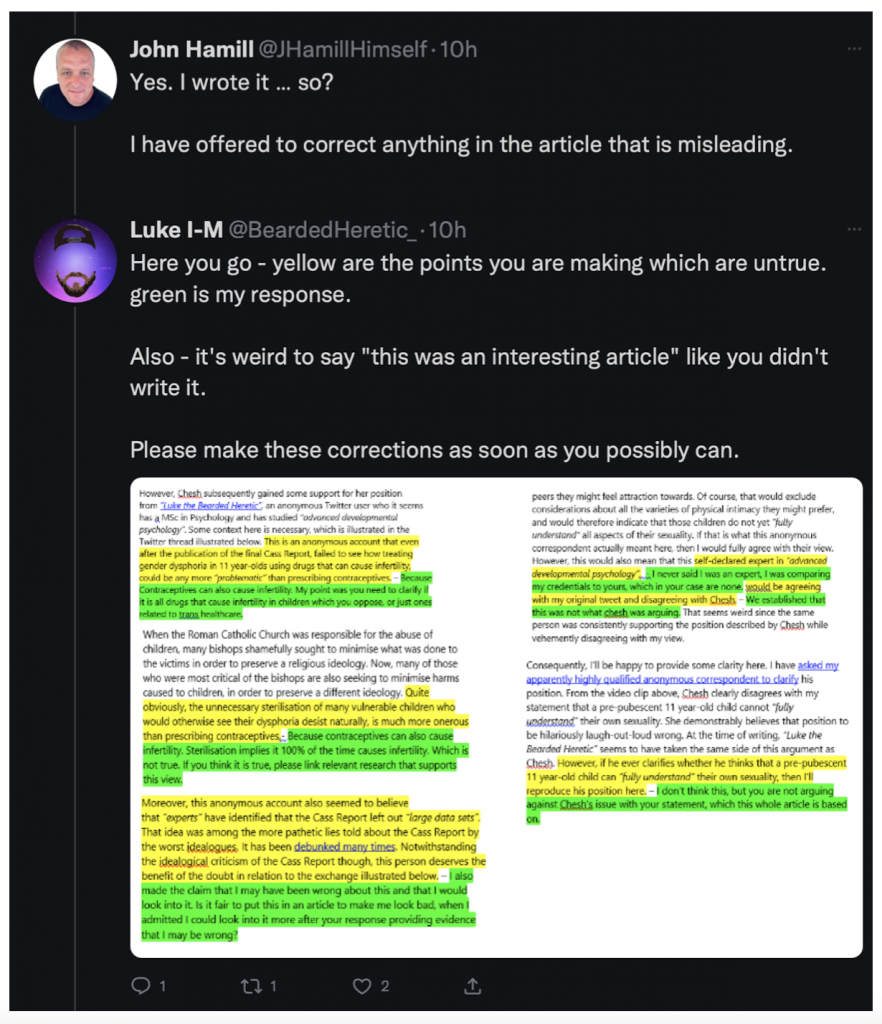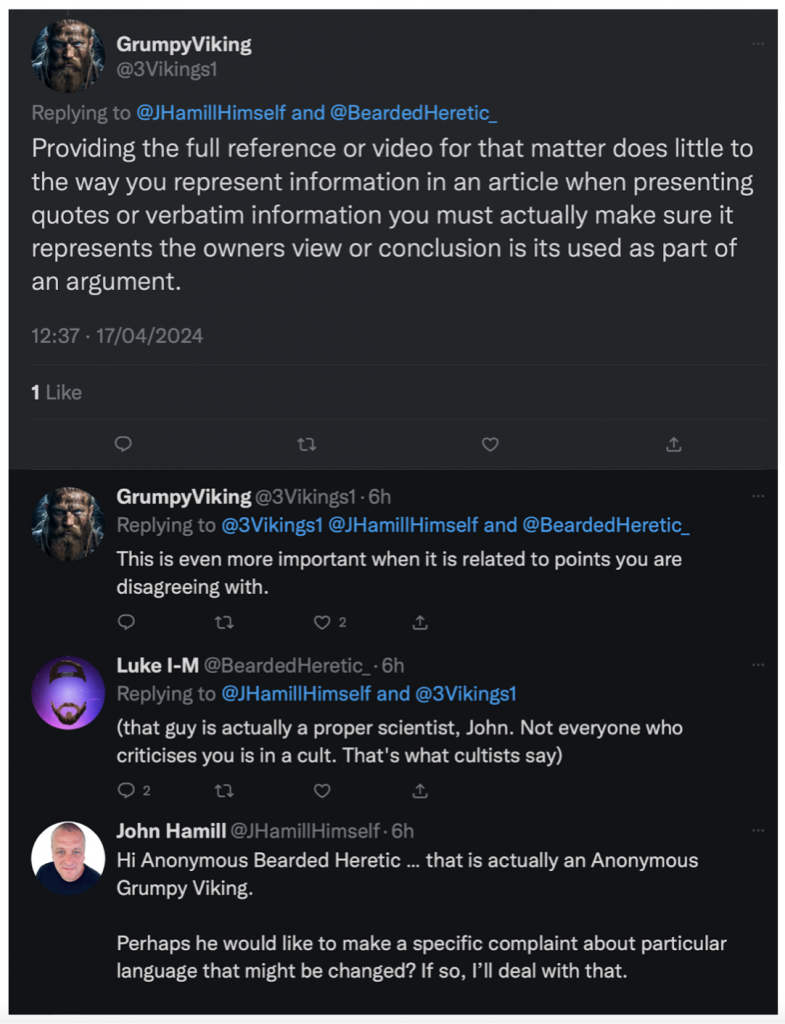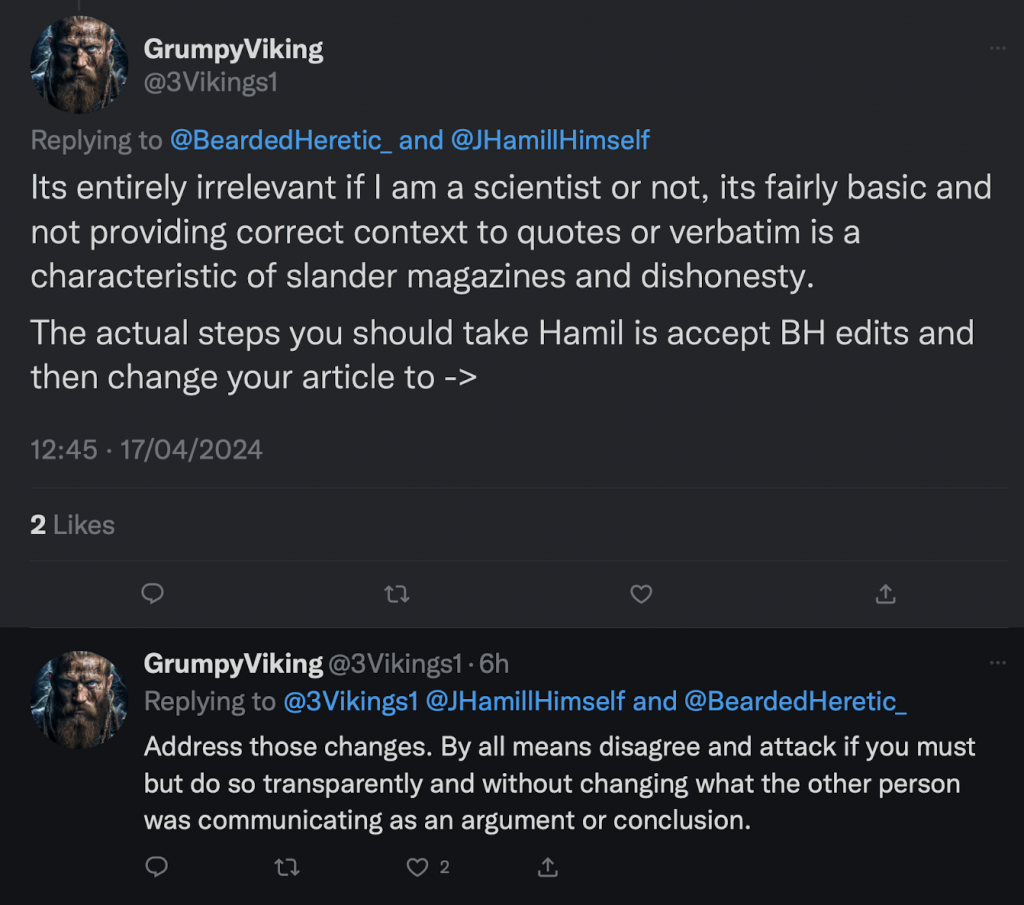Recently, I wrote another short article about the Cass Report. The article quoted several people who had disagreed with me. This included disagreements from “Luke the Bearded Heretic”, which is an anonymous Twitter account. At several points I thought that this person had been quite equivocal in their views, and so my article stated that “Luke the Bearded Heretic” should be given “the benefit of the doubt”. I promised to publish any clarifications he wished to provide, or correct anything in my article that was misleading. It didn’t take long for him to specify which parts of the article he thought were “untrue”, and where he wished me to “make corrections as soon as you possibly can”.

I updated the article on the same day to transparently make all of these comments available to readers. I don’t agree that any of them actually describe false or misleading statements in my article, and I included a few brief comments explaining why. Readers can see every word of the objections from “Luke the Bearded Heretic” in my article and make up their own minds. I believe that my article presented verbatim quotes in an entirely fair and accurate manner, but the specific complaints from “Luke the Bearded Heretic” are now also there in full.
This seems to raise an interesting question about what the best procedure should be when a correspondent objects to content in a blog article. Was my approach to dealing with the objections from “Luke the Bearded Heretic” sufficient? That question shortly became the topic of ongoing debate, when another anonymous Twitter account joined the discussion. I was informed that “Grumpy Viking” is in fact “actually a proper scientist”, no less. In fairness, he made a really good point.

It is perfectly correct that it is possible to misrepresent someone even when only providing verbatim quotes of their statements. For example, consider the following canonical example:
“All European people are apes. All African people are apes. All humans are apes.”
Easily misrepresented quote
This quote in full context is quite banal. However, it might also allow for easy misrepresentation of the author by extracting one particular sentence verbatim. In this sense, merely relying on the use of verbatim quotes only, does not in itself guarantee that there will be no misrepresentation. Against that, doesn’t the approach that I took to the complaints from “Luke the Bearded Heretic” solve this problem? That is, I did more than just respond to complaints by stating that the quotes I used were reproduced verbatim.
For example, consider that the author of the statement above had only one particular sentence extracted and published in a blog article as an isolated quote. Consider that the writer of that blog article responded to a complaint in exactly the same way that I did, by including every word of the complaint in the blog article. If any reasonable reader could see how the writer of the blog article behaved, they would take a very dim view of that writer while viewing the author of the original statement as fully vindicated. Publishing the full details of the complaint in an entirely transparent manner, such that all readers can then make up their own minds while in possession of all of the relevant information, seems to be a fair approach for all involved.
When I asked the anonymous “Grumpy Viking” for a specific example of where my approach was being unfair such that a change was required, he was unable to provide one. However, he did have further thoughts on what the proper approach should be.

The approach suggested by “actually a proper scientist” for dealing with complaints about blog articles, was to follow this sequence of steps:
- accept all proposed edits
- update the text of the blog article with the new language
- only then, disagree with the edits “if you must”
Consider how that would work in relation to a blog article about the emotional disposition of tenth century seafaring Scandinavians. If “actually a proper scientist” who wrote such a blog article was to receive complaints and then follow this approach, what would that involve? Consider a complaint insisting that all tenth century seafaring Scandinavians were universally ecstatic, and that anyone who suggested otherwise was in fact a fraud. Would “actually a proper scientist” immediately accept that, and make all commensurate changes to their blog article, before considering whether they might agree or otherwise?
It’s an interesting question. For now, I can suggest that if the anonymous “Grumpy Viking” has any complaints about this blog post, I will try to deal with them in the most fair and reasonable manner possible.